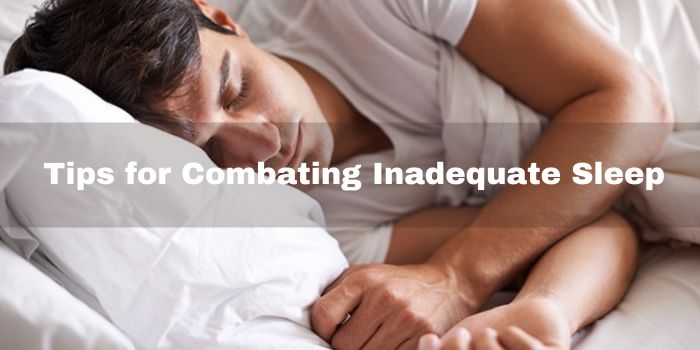Sleep Hygiene 101: Tips for Combating Inadequate Sleep
In the fast-paced rhythm of modern life, the importance of a good night’s sleep is often overshadowed by pressing deadlines, endless to-do lists, and the constant buzz of technology. However, the repercussions of inadequate sleep extend far beyond feeling tired the next day. The term “Combating Inadequate Sleep” encapsulates the proactive steps individuals can take to optimize their sleep hygiene and foster a more restful and rejuvenating sleep experience. Let’s explore some fundamental tips that form the cornerstone of effective sleep hygiene.
Establish a Consistent Sleep Schedule:
A regular sleep schedule is the foundation of good sleep hygiene. Going to bed and waking up simultaneously every day, even on weekends, helps regulate the body’s internal clock. This consistency reinforces the natural circadian rhythm, making it easier to fall asleep and wake up feeling refreshed. Aim for at least 7-9 hours of sleep per night to support overall health and well-being.
Create a Relaxing Bedtime Routine:
Establishing a calming pre-sleep routine signals your body that it’s time to wind down. Engage in relaxation activities like reading a book, taking a warm bath, or practicing gentle stretching exercises. Avoid stimulating activities or exposure to bright screens at least an hour before bedtime, as the blue light emitted by electronic devices can interfere with the production of melatonin, the sleep-inducing hormone.
Optimize Your Sleep Environment:
Transform your bedroom into a sleep-friendly sanctuary. Keep the room dark, quiet, and calm to create an ideal sleeping environment. Invest in a comfortable mattress and pillows that adequately support your body. Consider blackout curtains to block out external light, and use earplugs or a white noise machine to minimize disruptive sounds.
Limit Stimulants and Nicotine:
Caffeine and nicotine are stimulants that can interfere with the ability to fall asleep. Limit the consumption of caffeinated beverages like coffee, tea, and soda, especially in the hours leading up to bedtime. Similarly, avoid nicotine-containing products, as nicotine is a potent stimulant that can disrupt sleep patterns. Opt for a calming herbal tea or warm milk in the evening instead.
Exercise Regularly, but Mind the Timing:
Regular physical activity is associated with better sleep quality. However, the timing of exercise matters. Engage in moderate aerobic exercise, such as walking or jogging, at least 150 minutes per week, but try to finish your workout a few hours before bedtime. Intense physical activity close to bedtime may have the opposite effect, making it difficult to wind down and fall asleep.
Watch Your Diet:
What you eat can impact your sleep. Avoid heavy meals, spicy foods, and excessive fluid intake close to bedtime to prevent discomfort and frequent trips to the bathroom during the night. Consider a light, balanced snack if you’re hungry before bed. Include sleep-promoting foods rich in tryptophan, such as turkey, nuts, and dairy products, in your evening meals.
Unplug Before Bed:
The glow of screens from electronic devices can suppress melatonin production and disrupt the sleep-wake cycle. Establish a technology curfew by turning off phones, tablets, and computers at least an hour before bedtime. Keep electronic devices out of the bedroom to create a sleep-conducive environment.
Mindfulness and Relaxation Techniques:
Incorporate mindfulness and relaxation practices into your daily routine to combat stress and promote better sleep. Deep breathing exercises, meditation, and progressive muscle relaxation can help calm the mind and prepare the body for sleep. Engaging in these practices regularly contributes to improved sleep quality and overall well-being.
Consider Cognitive Behavioral Therapy for Insomnia (CBT-I):
If inadequate sleep persists despite implementing these tips, consider seeking the assistance of a healthcare professional trained in Cognitive Behavioral Therapy for Insomnia (CBT-I). CBT-I is a structured program that addresses sleep-related thoughts, behaviors, and attitudes, helping individuals develop healthier sleep habits and overcome insomnia.
Conclusion: Building a Foundation for Restful Sleep
In combating inadequate sleep, prioritizing sleep hygiene is a powerful strategy. Incorporating these tips into your daily routine can build a solid foundation for restful and rejuvenating sleep. Remember, the key lies in consistency and making these practices an integral part of your lifestyle. As you cultivate healthy sleep habits, you empower yourself to combat inadequate sleep and unlock the countless benefits of a good night’s rest. Sweet dreams await those who embrace the art of sleep hygiene.














Post Comment
You must be logged in to post a comment.